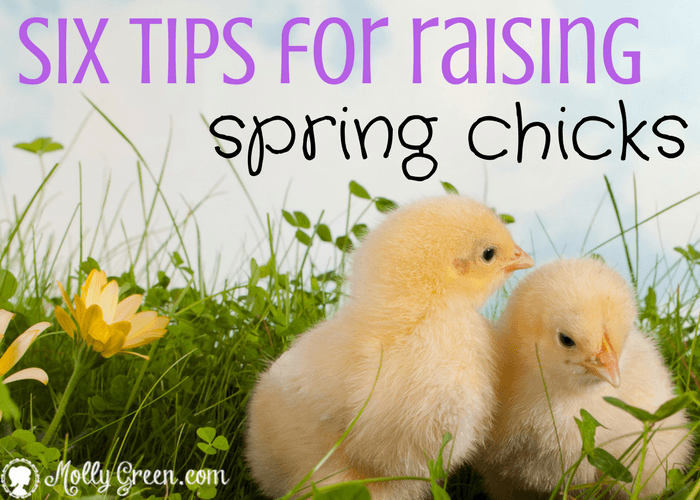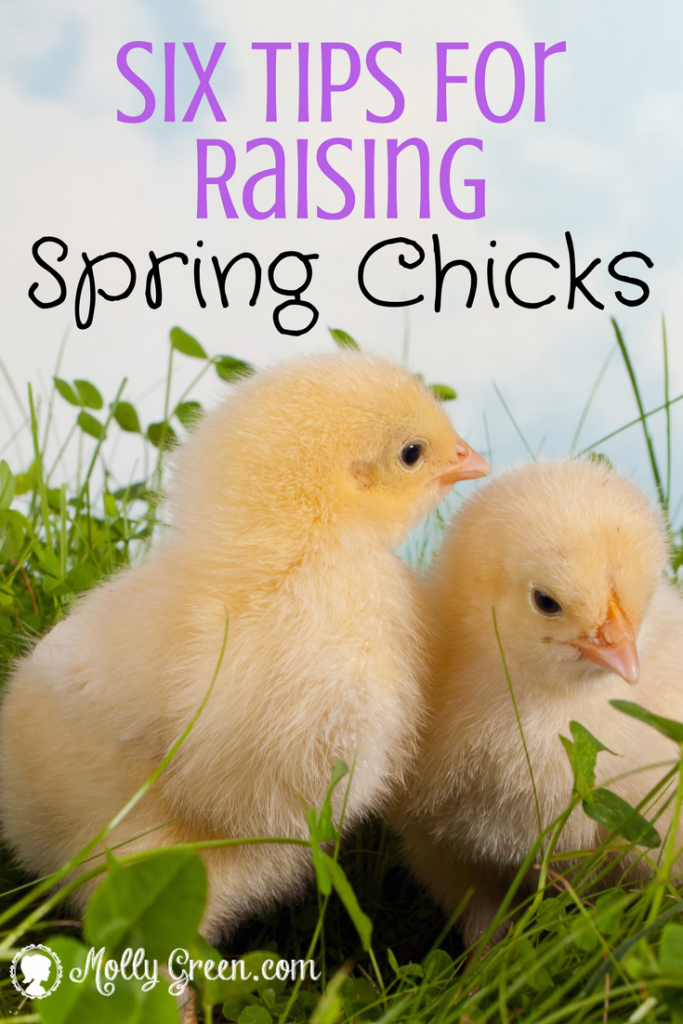By Lisa Steele
Before you succumb to temptation and bring home some peeping balls of yellow fluff from the feed store, be sure you know what raising baby chicks entails. This article is full of good information with a quick raising chicks checklist at the end.
6 Tips for Raising Spring Chicks
Safe Home: Plastic Tote or Cardboard Box for Chicks
Set up your chicks in a plastic tote or cardboard box with a screen on top to keep them safe from household pets and children. A small crate or cage with the lower part lined with plastic or cardboard to block drafts will also work.
On the bottom, layer some newspaper to absorb water spills, and then lay a piece of rubber shelf liner on top to give the baby chicks something to grip onto so they don’t slip. The bedding should be changed as needed.
Chicks Need a Heat Lamp
Until they get their feathers (around 8 weeks old), baby chicks can’t regulate their body temperature to keep warm, so you need to provide heat for them. A heat lamp with a red bulb is best – white light can cause stress, pecking and aggression issues.
Start the temperature at 95 degrees, then reduce it by 5 degrees per week. Position the light at one end of the box, so the chicks can move closer if they are cold or away if they are too warm.
Note: Chicks peeping loudly are cold, while those holding out their wings or panting are too warm, so adjust the heat accordingly.
Baby Chickens Need Water
Room temperature water is best and should be refreshed when it becomes dirty. Adding a bit of sugar for the first few days will give your chicks a nice energy boost, and then a few drops of apple cider vinegar (the good stuff with the “mother” in it, such as Bragg) helps develop strong respiratory and immune systems. Baby chicks are rather top-heavy and can easily fall into a water dish and drown, so add a few marbles or stones to the waterer until the chicks grow a bit.
Chicks Eat Starter Feed
For the first eight weeks that they are indoors, the baby chicks will be eating chick starter feed. Adding a bit of garlic powder to the feed can help boost their immune systems. Probiotic powder mixed into their feed will keep their digestive tracts working smoothly, and a bit of ground cornmeal or raw oats can help prevent a potentially fatal condition known as “pasty butt” in which the chick’s vent can get clogged with feces.
Sprinkling a bit of feed onto a paper plate and then tapping the plate with your finger mimics a mother hen eating and can help your chicks learn where their food is.
How to Entertain Chickens
To keep your chicks from getting bored, put some clumps of grass, dirt and all, in the box for them. They love scratching through the dirt looking for bugs and nibbling at pieces of grass. You can also attach some dowels in one corner of the box at various heights to let the chicks practice roosting. A small mirror will provide them entertainment as they catch sight of themselves in the reflection, and a small dish of dirt lets them practice taking dust baths, an important activity for chickens.
When Can Chicks Go Outside?
After about eight weeks, if you have timed it right, the temperatures shouldn’t be going much below sixty degrees at night and your chicks will be ready to go outside. They will be safest in a secure coop or shed with an attached pen, so hopefully you’ve given this some thought as your chicks were growing.
The temptation is great, I know, and raising chicks is a wonderful experience, so now you know the basics of raising baby chicks to adult chickens.
Quick Raising Chicks Checklist
Here’s what you’ll need before you get your chicks:
- Cardboard Box or Plastic Tote
- Heat Lamp with Red Bulb
- Small Thermometer
- Chick Starter Feed
- Chick-sized Feeder
- Chick-sized Waterer
- Sugar
- Marbles or Stones
- Rubber Shelf liner
- Newspaper
Lisa Steele is a fifth generation chicken keeper who lives with her husband and flock of two dozen chickens and ducks on a farm in Maine. She is the author of Fresh Eggs Daily: Raising Happy Healthy Chickens … Naturally and the companion duck book titled Duck Eggs Daily. She is also an avid gardener and aspiring herbalist and offers natural poultry-keeping advice on her Fresh Eggs Daily facebook page and blog at www.fresheggsdaily.com






